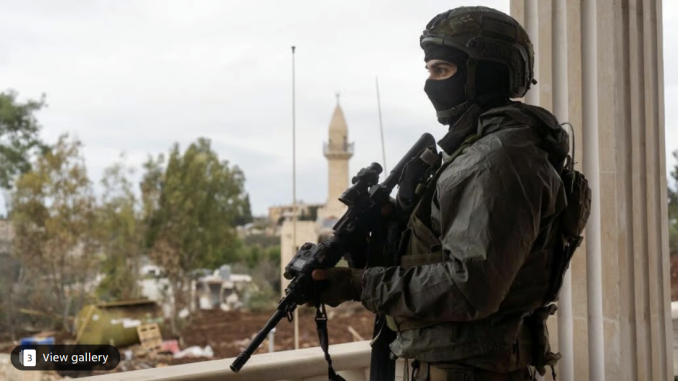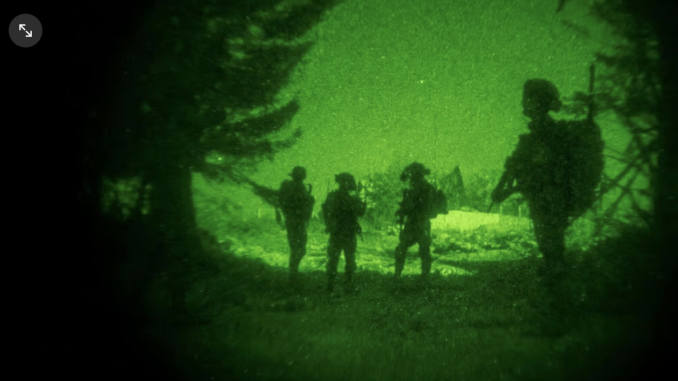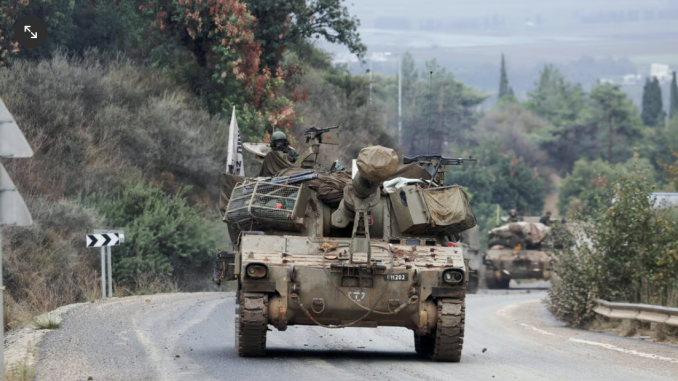Peloni: The path to victory over Hezbollah goes thru Tehran. Any action taken in Lebanon should be understood to be merely one of force containment and degradation of capabilities, but not of victory. So long as the Mullahs persist to enslave the Iranian people, they will work their will over the Lebanese people as well, and no dialogue or calls for revolt should be anticipated to squeeze blood from the Lebanese turnip.
Analysis: Israel must create conditions that permanently prevent Hezbollah from regaining the capacity to threaten our communities and citizens
Amir Avivi | November 28, 2024
 IDF forces in Lebanon (Photo: IDF Spokesperson’s Unit)
IDF forces in Lebanon (Photo: IDF Spokesperson’s Unit)
The Israeli public often tends to form strong opinions on issues without fully understanding the details, and the anticipated cease-fire in the north is no exception. The public discourse is filled with voices expressing harsh criticism and even anger toward the proposed 60-day cease-fire along the northern border.
In fact, residents of northern Israel are expected to stage demonstrations against the emerging agreement. Many feel a sense of déjà vu, recalling the events of 2006, and fear that Hezbollah will soon reestablish its presence along our border. There is a widespread sentiment that we are missing a historic opportunity to permanently resolve the persistent threat posed by the Shiite forces at the northern border.
Their concerns are valid and demand a thoughtful, comprehensive response — not hasty decisions made before gaining a clear understanding of the situation on the ground, the specifics of the agreement, and the implications and opportunities the new circumstances may present.
First, we must explore the difference between Gaza and Lebanon. In Gaza, Israel’s political and military echelons assigned the war a clear objective: eliminating Hamas as a governmental and military force. That objective requires conquering territory in the Gaza Strip, as is in fact being done.
In the north, however, it is unrealistic to expect the IDF to completely dismantle Hezbollah without taking and holding territory—territory that would encompass all of Lebanon.
Consequently, a different objective has been set for the northern front: enabling Israelis living near the border to return safely to their homes.
It is clear to any observer of the conflict that Israel has dealt significant blows to Hezbollah and retains the capacity to further pressure the organization that has entrenched itself in Lebanon. At this juncture, several key options are available:
The first option involves mobilizing Lebanese elements, in coordination with the international community, to disband Hezbollah as a military organization. This effort would align with the objectives of UN Resolution 1559 or, at the very least, lead to the dismantling of Hezbollah’s infrastructure in southern Lebanon.
Regardless of the approach taken, Israel’s freedom of action must be safeguarded to ensure Hezbollah cannot regain its strength in the future. This is a fundamental condition for any agreement. Our security must remain firmly under our control.
In any scenario where Lebanon is unable to prevent a Hezbollah resurgence, the response must be decisive IDF action to thwart any attempt to rebuild the organization’s strength. Hezbollah must be unable to recover, even beyond the Litani River.
Two alternative strategies could involve Lebanese elements in dismantling Hezbollah: the carrot and the stick. Personally, I favor the stick — an approach in which the Lebanese state’s infrastructure is targeted first, sending a clear message that Israel does not differentiate between Lebanon and Hezbollah.
Lebanon should face a significant penalty, one that would compel other factions to actively work toward Hezbollah’s dissolution in order to avoid the heavy price Israel would impose on them.
Contrary to many opinions, including my own, the Israeli government chose the carrot approach. The message sent to all Lebanese factions is that the war is aimed solely at Hezbollah, not at them. Israel is offering dialogue to collaborate on dismantling Hezbollah and is committed to weakening the group to the point where other forces can take action. Whether the carrot strategy will prove effective remains to be seen — only time will tell.
 IDF forces in southern Lebanon (Photo: IDF Spokesperson’s Unit)
IDF forces in southern Lebanon (Photo: IDF Spokesperson’s Unit)
Stick to the chosen strategy
Another advantage of this strategy is that it gradually builds broader international legitimacy for Israeli military action. Since adopting the carrot approach, Israel has maintained a dialogue with various Lebanese factions. Therefore, any abrupt shift in strategy, particularly initiating attacks on infrastructure, would undermine our efforts and yield little benefit.
The chosen strategy must be upheld to ensure consistency, demonstrating steadfastness in its execution.
Israel’s approach to managing developments envisions any cease-fire as temporary, pending Trump’s return to the White House. Rather than signaling permanence, it will offer flexibility for future decision-making. At this stage, the onus will be on Lebanon and the international community to demonstrate their commitment by dismantling Hezbollah’s infrastructure in southern Lebanon within 60 days.
This process will be crucial in creating the conditions for the safe return of our northern residents to their homes, while also delivering a severe humiliation to Hezbollah. Such humiliation is not only important for our sense of pride, but more importantly, because the culture in our region views the ability to publicly flaunt a victory as a sign of strength and credible deterrence.
Another key consideration is the successful conclusion of the IDF’s ground operation and the subsequent redeployment of forces to the Gaza theater. It is crucial to remember that hostages are still being held there, and the mission to dismantle Hamas remains unfinished. Strategically, stabilizing one front makes sense in order to prepare for a broader offensive that will decisively end the fighting in the second front once and for all.
 IDF forces in southern Lebanon (Photo: REUTERS/Ronen Zvulun)
IDF forces in southern Lebanon (Photo: REUTERS/Ronen Zvulun)
In this context, it is important to recognize that the primary focus of the attack must shift to the Iranian front, with efforts directed at convincing the Trump administration to take military action against the Ayatollahs’ regime.
This necessity arises from the critical need to dismantle the Iranian nuclear program and eliminate the Iranian threat entirely—an existential danger that demands the overthrow of the Shiite axis. Consequently, the defeat of Hezbollah is inextricably linked to Tehran.
In conclusion, we must uphold the principle that makes our sacrifices meaningful: maintaining control over our own security. It is imperative to create conditions that permanently prevent Hezbollah from regaining the capacity to threaten our communities and citizens.
Brig. Gen. (res.) Amir Avivi is the founder of Israel’s Defense and Security Forum (IDSF).



Nobody can differentiate between Lebanon and Hezbollah. Hezbollah, although defeated in battle is still the main actor in the Lebanese government. This means that any cooperation between Lebanon and Israel is actually cooperation between Hezbollah and Israel. Since none of these parties can be trusted to hold to an agreement, this is an exercise in futility. The stick approach will only lead to further denunciation at the ICC, ICJ and UNSC, so actually, these problems, (ICC, ICJ and UNSC) must be solved before Lebanon can be solved. As long as these institutions oppose Israeli actions of self-defense, we must act in Lebanon solely for our own interest.
This is a good move when considering the activities of the ObamaBidenHarris
administration which is just as likely to leave a cuckoo’s egg in our nest as anything else. If we can somehow avoid being shot in the back by our own allies, we can consider a future with Trump.
Trump has often boasted that he has not started a war during his administration. Why do we even consider that he will attack the Ayatollah’s regime or take out their nuclear infrastructure? This is something Israel must do if it is to be done at all. So, dear Bibi, Mossad, Shin Beth and IDF, get back to the drawing board and set up appropriate plans to kill the Iranian nuclear industry while leaving the Iranians alive. This is not as easy as it sounds and the shit storm will be unbearable, but the whole world knows that this must be done and would simply be choosing the convenient side. For this to happen, suitable ammunition must be acquired…
With regard to the plans on the drawing board, the October 7, 2023 episode must be settled first. Otherwise, Bibi will not be able to direct the needed operation because, at least according to all we have gleaned from his statements over the past year, he will not be able to trust the Mossad, the Shin Beth or the IDF to do what is needed. The most likely source of contention is still the US deep state, which, for some reason, has too much control over them.